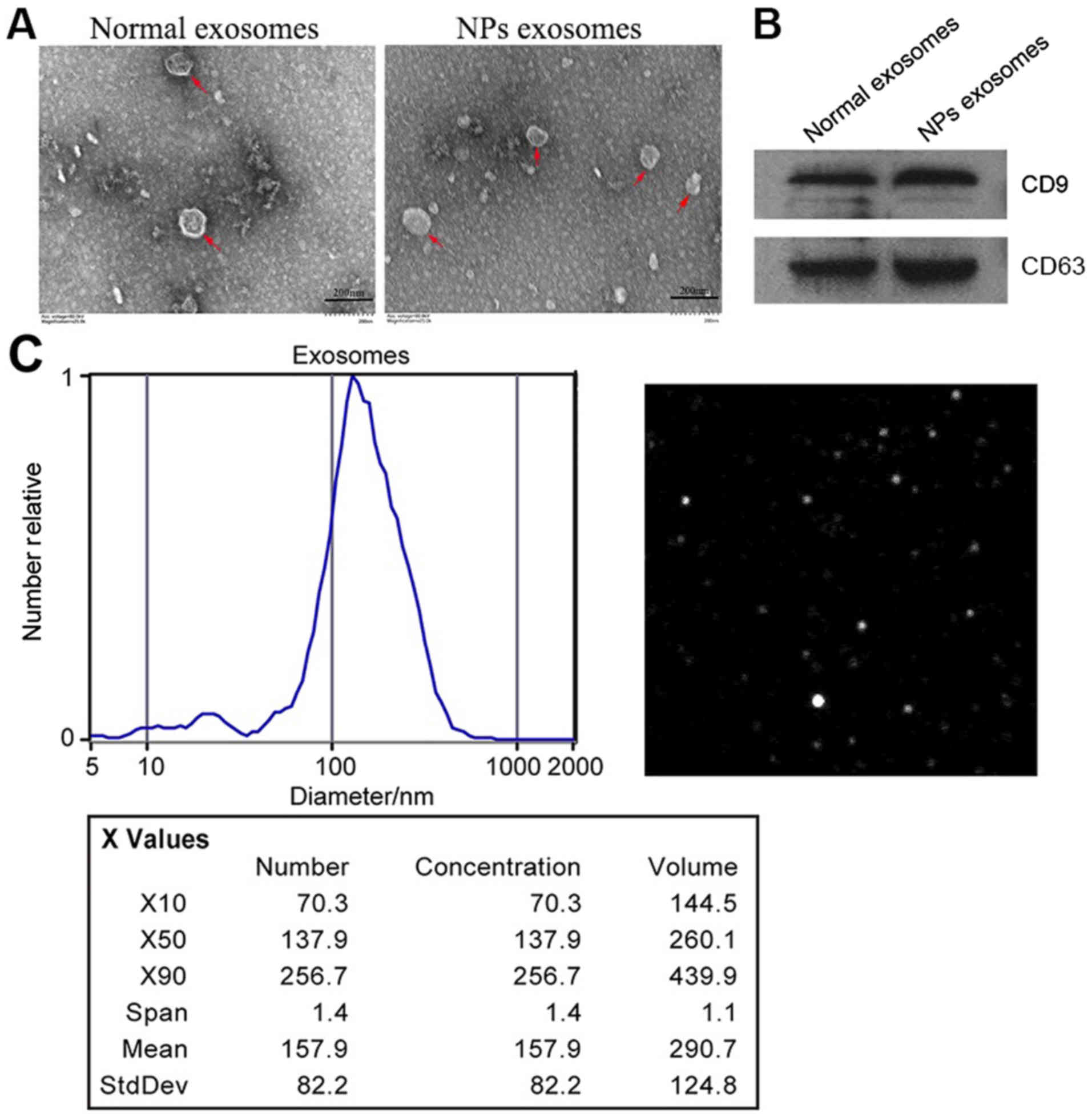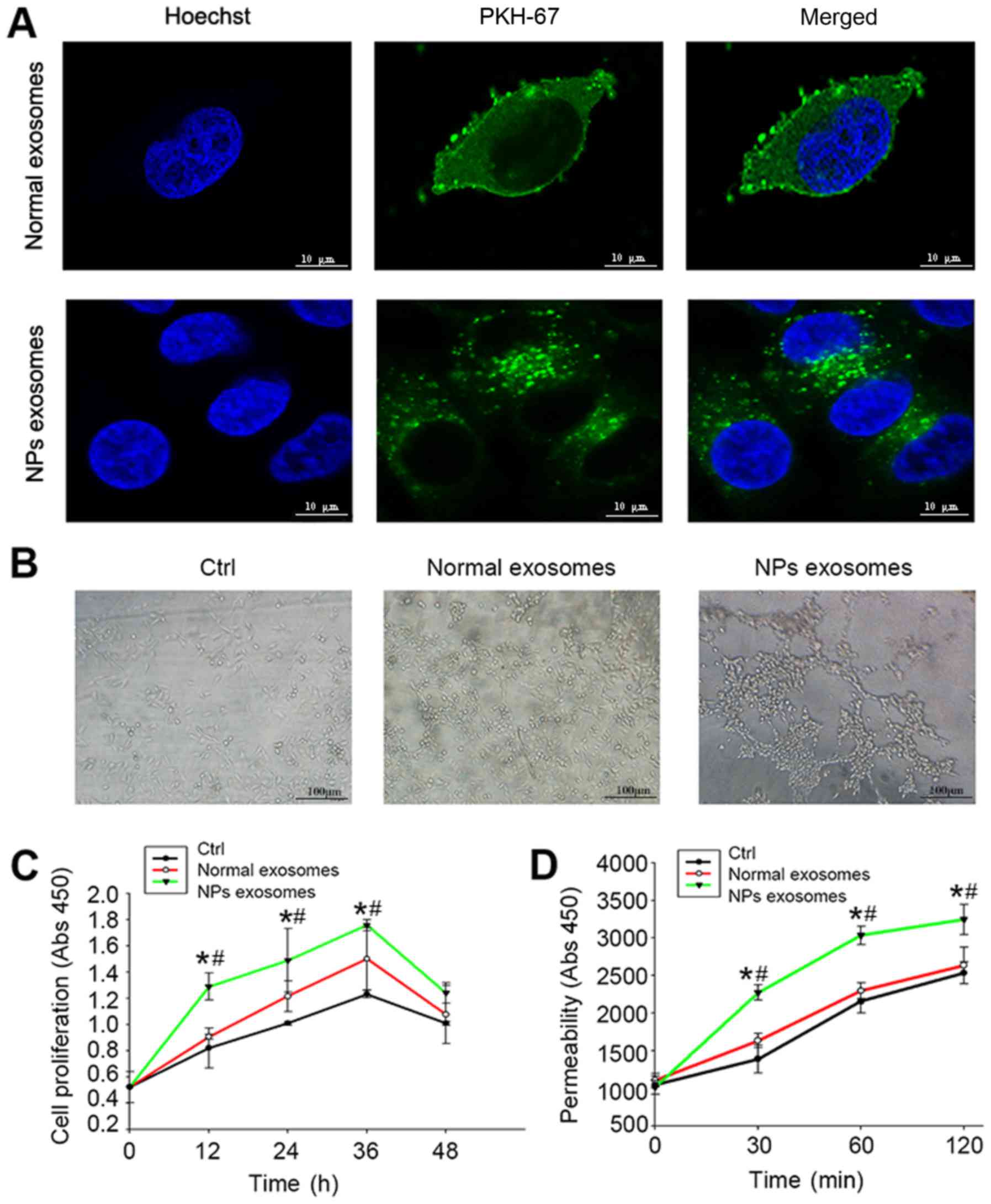|
1
|
Fokkens WJ, Lund VJ, Mullol J, Bachert C,
Alobid I, Baroody F, Cohen N, Cervin A, Douglas R, Gevaert P, et
al: EPOS 2012: European position paper on rhinosinusitis and nasal
polyps 2012. A summary for otorhinolaryngologists. Rhinology.
50:1–12. 2012.PubMed/NCBI
|
|
2
|
Wang C, Lou H, Wang X, Wang Y, Fan E, Li
Y, Wang H, Bachert C and Zhang L: Effect of budesonide transnasal
nebulization in patients with eosinophilic chronic rhinosinusitis
with nasal polyps. J Allergy Clin Immunol. 135:922–929.e6. 2015.
View Article : Google Scholar : PubMed/NCBI
|
|
3
|
Coste A, Rateau JG, Roudot-Thoraval F,
Chapelin C, Gilain L, Poron F, Peynegre R, Bernaudin JF and
Escudier E: Increased epithelial cell proliferation in nasal
polyps. Arch Otolaryngol Head Neck Surg. 122:432–436. 1996.
View Article : Google Scholar : PubMed/NCBI
|
|
4
|
Yukitatsu Y, Hata M, Yamanegi K, Yamada N,
Ohyama H, Nakasho K, Kojima Y, Oka H, Tsuzuki K, Sakagami M and
Terada N: Decreased expression of VE-cadherin and claudin-5 and
increased phosphorylation of VE-cadherin in vascular endothelium in
nasal polyps. Cell Tissue Res. 352:647–657. 2013. View Article : Google Scholar : PubMed/NCBI
|
|
5
|
Gosepath J, Brieger J, Lehr HA and Mann
WJ: Expression, localization, and significance of vascular
permeability/vascular endothelial growth factor in nasal polyps. Am
J Rhinol. 19:7–13. 2005.PubMed/NCBI
|
|
6
|
Record M, Subra C, Silvente-Poirot S and
Poirot M: Exosomes as intercellular signalosomes and
pharmacological effectors. Biochem Pharmacol. 81:1171–1182. 2011.
View Article : Google Scholar : PubMed/NCBI
|
|
7
|
Kulshreshtha A, Ahmad T, Agrawal A and
Ghosh B: Proinflammatory role of epithelial cell-derived exosomes
in allergic airway inflammation. J Allergy Clin Immunol.
131:1194–1203, 1203.e1-e14. 2013. View Article : Google Scholar : PubMed/NCBI
|
|
8
|
Honegger A, Schilling D, Bastian S,
Sponagel J, Kuryshev V, Sültmann H, Scheffner M, Hoppe-Seyler K and
Hoppe-Seyler F: Dependence of intracellular and exosomal microRNAs
on viral E6/E7 oncogene expression in HPV-positive tumor cells.
PLoS Pathog. 11:e10047122015. View Article : Google Scholar : PubMed/NCBI
|
|
9
|
You B, Cao X, Shao X, Ni H, Shi S, Shan Y,
Gu Z and You Y: Clinical and biological significance of HAX-1
overexpression in nasopharyngeal carcinoma. Oncotarget.
7:12505–12524. 2016. View Article : Google Scholar : PubMed/NCBI
|
|
10
|
You Y, Shan Y, Chen J, Yue H, You B, Shi
S, Li X and Cao X: Matrix metalloproteinase 13-containing exosomes
promote nasopharyngeal carcinoma metastasis. Cancer Sci.
106:1669–1677. 2015. View Article : Google Scholar : PubMed/NCBI
|
|
11
|
Nakayama A: Proteomic analysis of urinary
exosomes. Rinsho Byori. 62:684–691. 2014.(In Japanese). PubMed/NCBI
|
|
12
|
Näslund TI, Paquin-Proulx D, Paredes PT,
Vallhov H, Sandberg JK and Gabrielsson S: Exosomes from breast milk
inhibit HIV-1 infection of dendritic cells and subsequent viral
transfer to CD4+ T cells. AIDS. 28:171–180. 2014.
View Article : Google Scholar : PubMed/NCBI
|
|
13
|
Lässer C, O'Neil SE, Ekerljung L, Ekström
K, Sjöstrand M and Lötvall J: RNA-containing exosomes in human
nasal secretions. Am J Rhinol Allergy. 25:89–93. 2011. View Article : Google Scholar : PubMed/NCBI
|
|
14
|
Choi EB, Hong SW, Kim DK, Jeon SG, Kim KR,
Cho SH, Gho YS, Jee YK and Kim YK: Decreased diversity of nasal
microbiota and their secreted extracellular vesicles in patients
with chronic rhinosinusitis based on a metagenomic analysis.
Allergy. 69:517–526. 2014. View Article : Google Scholar : PubMed/NCBI
|
|
15
|
Lässer C, O'Neil SE, Shelke GV, Sihlbom C,
Hansson SF, Gho YS, Lundbäck B and Lötvall J: Exosomes in the nose
induce immune cell trafficking and harbour an altered protein cargo
in chronic airway inflammation. J Transl Med. 14:1812016.
View Article : Google Scholar : PubMed/NCBI
|
|
16
|
Sampey GC, Saifuddin M, Schwab A, Barclay
R, Punya S, Chung MC, Hakami RM, Zadeh MA, Lepene B, Klase ZA, et
al: Exosomes from HIV-1-infected cells stimulate production of
pro-inflammatory cytokines through trans-activating response (TAR)
RNA. J Biol Chem. 291:1251–1266. 2016. View Article : Google Scholar : PubMed/NCBI
|
|
17
|
Wang X, Gu H, Qin D, Yang L, Huang W,
Essandoh K, Wang Y, Caldwell CC, Peng T, Zingarelli B and Fan GC:
Exosomal miR-223 contributes to mesenchymal stem cell-elicited
cardioprotection in polymicrobial sepsis. Sci Rep. 5:137212015.
View Article : Google Scholar : PubMed/NCBI
|
|
18
|
Lee SL, Rouhi P, Dahl Jensen L, Zhang D,
Ji H, Hauptmann G, Ingham P and Cao Y: Hypoxia-induced pathological
angiogenesis mediates tumor cell dissemination, invasion, and
metastasis in a zebrafish tumor model. Proc Natl Acad Sci USA.
106:pp. 19485–19490. 2009; View Article : Google Scholar : PubMed/NCBI
|
|
19
|
Kalani A, Kamat PK, Chaturvedi P, Tyagi SC
and Tyagi N: Curcumin-primed exosomes mitigate endothelial cell
dysfunction during hyperhomocysteinemia. Life Sci. 107:1–7. 2014.
View Article : Google Scholar : PubMed/NCBI
|
|
20
|
Isozaki T, Rabquer BJ, Ruth JH, Haines GK
III and Koch AE: ADAM-10 is overexpressed in rheumatoid arthritis
synovial tissue and mediates angiogenesis. Arthritis Rheum.
65:98–108. 2013. View Article : Google Scholar : PubMed/NCBI
|
|
21
|
Blobel CP: Metalloprotease-disintegrins:
Links to cell adhesion and cleavage of TNF alpha and Notch. Cell.
90:589–592. 1997. View Article : Google Scholar : PubMed/NCBI
|
|
22
|
You B, Shan Y, Shi S, Li X and You Y:
Effects of ADAM10 upregulation on progression, migration and
prognosis of nasopharyngeal carcinoma. Cancer Sci. 106:1506–1514.
2015. View Article : Google Scholar : PubMed/NCBI
|
|
23
|
Chueh HW, Park SK, Hur DY and Bae WY:
Expression profile of ADAM10 and ADAM17 in allergic rhinitis. Int
Forum Allergy Rhinol. 5:1036–1041. 2015. View Article : Google Scholar : PubMed/NCBI
|
|
24
|
Schulz B, Pruessmeyer J, Maretzky T,
Ludwig A, Blobel CP, Saftig P and Reiss K: ADAM10 regulates
endothelial permeability and T-cell transmigration by proteolysis
of vascular endothelial cadherin. Circ Res. 102:1192–1201. 2008.
View Article : Google Scholar : PubMed/NCBI
|
|
25
|
Donners MM, Wolfs IM, Olieslagers S,
Mohammadi-Motahhari Z, Tchaikovski V, Heeneman S, van Buul JD,
Caolo V, Molin DG, Post MJ and Waltenberger J: A disintegrin and
metalloprotease 10 is a novel mediator of vascular endothelial
growth factor-induced endothelial cell function in angiogenesis and
is associated with atherosclerosis. Arterioscler Thromb Vasc Biol.
30:2188–2195. 2010. View Article : Google Scholar : PubMed/NCBI
|
|
26
|
Reiss K, Cornelsen I, Husmann M, Gimpl G
and Bhakdi S: Unsaturated fatty acids drive disintegrin and
metalloproteinase (ADAM)-dependent cell adhesion, proliferation,
and migration by modulating membrane fluidity. J Biol Chem.
286:26931–26942. 2011. View Article : Google Scholar : PubMed/NCBI
|
|
27
|
Howarth PH, Persson CG, Meltzer EO,
Jacobson MR, Durham SR and Silkoff PE: Objective monitoring of
nasal airway inflammation in rhinitis. J Allergy Clin Immunol. 115
3 Suppl 1:S414–S441. 2005. View Article : Google Scholar : PubMed/NCBI
|
|
28
|
Valadi H, Ekström K, Bossios A, Sjöstrand
M, Lee JJ and Lötvall JO: Exosome-mediated transfer of mRNAs and
microRNAs is a novel mechanism of genetic exchange between cells.
Nat Cell Biol. 9:654–659. 2007. View
Article : Google Scholar : PubMed/NCBI
|
|
29
|
Romancino DP, Paterniti G, Campos Y, De
Luca A, Di Felice V, d'Azzo A and Bongiovanni A: Identification and
characterization of the nano-sized vesicles released by muscle
cells. FEBS Lett. 587:1379–1384. 2013. View Article : Google Scholar : PubMed/NCBI
|
|
30
|
Hellquist HB: Nasal polyps update.
Histopathology. Allergy Asthma Proc. 17:pp. 237–242. 1996;
View Article : Google Scholar : PubMed/NCBI
|
|
31
|
Slavin RG: Nasal polyps and sinusitis.
Clin Allergy Immunol. 16:295–309. 2002.PubMed/NCBI
|
|
32
|
Watanabe K and Komatsuzaki A:
Ultrastructural findings of capillaries in nasal polyps. Rhinology.
30:49–56. 1992.PubMed/NCBI
|
|
33
|
Higginbotham JN, Demory BM, Gephart JD,
Franklin JL, Bogatcheva G, Kremers GJ, Piston DW, Ayers GD,
McConnell RE, Tyska MJ and Coffey RJ: Amphiregulin exosomes
increase cancer cell invasion. Curr Biol. 21:779–786. 2011.
View Article : Google Scholar : PubMed/NCBI
|
|
34
|
Hood JL, San RS and Wickline SA: Exosomes
released by melanoma cells prepare sentinel lymph nodes for tumor
metastasis. Cancer Res. 71:3792–3801. 2011. View Article : Google Scholar : PubMed/NCBI
|
|
35
|
Martinez-Bravo MJ, Wahlund CJ, Qazi KR,
Moulder R, Lukic A, Rådmark O, Lahesmaa R, Grunewald J, Eklund A
and Gabrielsson S: Pulmonary sarcoidosis is associated with
exosomal vitamin D-binding protein and inflammatory molecules. J
Allergy Clin Immunol. 139:1186–1194. 2016. View Article : Google Scholar : PubMed/NCBI
|
|
36
|
Zhu M, Li Y, Shi J, Feng W, Nie G and Zhao
Y: Exosomes as extrapulmonary signaling conveyors for
nanoparticle-induced systemic immune activation. Small. 8:404–412.
2012. View Article : Google Scholar : PubMed/NCBI
|
|
37
|
Bashratyan R, Sheng H, Regn D, Rahman MJ
and Dai YD: Insulinoma-released exosomes activate autoreactive
marginal zone-like B cells that expand endogenously in prediabetic
NOD mice. Eur J Immunol. 43:2588–2597. 2013. View Article : Google Scholar : PubMed/NCBI
|
|
38
|
Dreymueller D, Uhlig S and Ludwig A:
ADAM-family metalloproteinases in lung inflammation: Potential
therapeutic targets. Am J Physiol Lung Cell Mol Physiol.
308:L325–L343. 2015. View Article : Google Scholar : PubMed/NCBI
|
|
39
|
Erbek SS, Erinanc H, Erbek S, Topal O and
Kiyici H: Expression of a disintegrin and metalloproteinase 33
protein in nasal polyposis: An immunohistochemical study. Am J
Rhinol Allergy. 24:79–82. 2010. View Article : Google Scholar : PubMed/NCBI
|
|
40
|
Erbek SS, Hizal E, Erinanc H and Erbek S:
Expression of a disintegrin and metalloproteinase 8 by inflammatory
cells in nasal polyps. Am J Rhinol Allergy. 27:1512013. View Article : Google Scholar : PubMed/NCBI
|

















